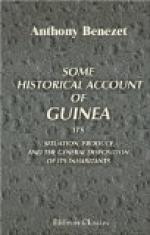[Footnote A: See Kolban’s account of the Cape of Good Hope.]
Father Tachard, a French Jesuit, famous for his travels in the East Indies, in his account of these people, says, “The Hottentots have more honesty, love, and liberality for one another, than are almost anywhere seen amongst christians.”
CHAP. X.
Man-stealing esteemed highly criminal, and punishable by the laws of Guinea: No Negroes allowed to be sold for slaves there, but those deemed prisoners of war, or in punishment for crimes. Some of the Negroe rulers, corrupted by the Europeans, violently infringe the laws of Guinea. The King of Barsailay noted in that respect.
By an inquiry into the laws and customs formerly in use, and still in force amongst the Negroes, particularly on the Gold Coast, it will be found, that provision was made for the general peace, and for the safety of individuals; even in W. Bosman’s time, long after the Europeans had established the slave-trade, the natives were not publicly enslaved, any otherwise than in punishment for crimes, when prisoners of war, or by a violent exertion of the power of their corrupted Kings. Where any of the natives were stolen, in order to be sold to the Europeans, it was done secretly, or at least, only connived at by those in power: this appears From Barbot and Bosman’s account of the matter, both agreeing that man-stealing was not allowed on the Gold Coast. The first[A] says, “Kidnapping or stealing of human creatures is punished there, and even sometimes with death.” And, W. Bosman, whose long residence on the coast, enabled him to speak with certainty, says,[B] “That the laws were severe against murder, thievery, and adultery.” And adds, “That man-stealing was punished on the Gold Coast with rigid severity and sometimes with death itself.” Hence it may be concluded, that the sale of the greatest part of the Negroes to the Europeans is supported by violence, in defiance of the laws, through the knavery of their principal men,[C] who, (as is too often the case with those in European countries) under pretence of encouraging trade, and increasing the public revenue, disregard the dictates of justice, and trample upon those liberties which they are appointed to preserve.




